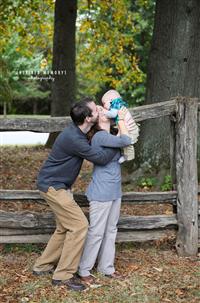By Guest Blogger Joseph Lambert
As a parent of 18 month-old George, I think a lot about his well-being.Although I don’t like to consider the possibility that I might not be able to raise my son, I have to prepare for the worst for his sake.
As an attorney practicing estate law, I have learned some basic legal steps parents can take to contribute to their children’s success and security. Recommended first steps include nominating a guardian and ensuring the desired transfer of your assets.
Nominating a Guardian
Who will care for your children if the unthinkable happens? A family that I knew growing up suffered the loss of both parents. Sadly, the surviving family disagreed about who would get custody of the young children, and a lengthy court battle ensued. An already difficult situation was made much worse because the parents had not provided clear directions.
In North Carolina, the appointment of a guardian is a court-supervised process in which the court determines what is in the “best interest” of the child. Parents should nominate a guardian for their child(ren) in a valid will. While the parents’ nomination is not binding on the court, it is considered to be a “strong guide” for the court and is usually followed. If you fail to nominate a guardian of your child(ren), the court will determine what is in the child’s “best interest” without your guidance.
Transferring Assets
The law treats the passage of property differently depending on the type. For simplicity, let’s look at three types of property: 1) Titled Property, 2) Property with Beneficiaries, and 3) Will/Intestate Property.
Titled Property
Titled property (e.g. real estate) often passes to a surviving spouse automatically at death. Most married couples in North Carolina own their homes as “tenants by the entirety.” This means that when the first spouse passes away, the surviving spouse takes full ownership of the property. If desired, couples can choose a different type of ownership interest. Single individuals would usually pass title to their home through a will.
Property with Beneficiaries
One of the most important and simple steps that parents can take is properly designating beneficiaries on life insurance policies, retirement accounts, and bank accounts. Typically, you are able to designate primary and contingent beneficiaries. The primary beneficiary will receive the benefit of the account or policy at the death of the owner. The contingent beneficiary will receive the benefit when the primary beneficiary has not survived the owner. Most married couples list their spouse as the primary beneficiary and their children or their trustee as contingent beneficiaries. Single parents typically list their children or a trustee in a will as the primary beneficiary.
Some important tips:
(1) Remember to add a new child as a beneficiary if his/her older siblings are already named. Failure to do so will result in the named children receiving the funds and the omitted child receiving nothing.
(2) For divorced individuals, remove your ex-spouse as a beneficiary. Divorce does not automatically remove the ex-spouse as a beneficiary as it does in wills. If you were to pass away without changing the beneficiary designation, your ex-spouse will receive the life insurance or account benefits.
Property Controlled by Will or Intestacy
Property that does not pass in the ways described above is typically governed by a “last will and testament”. This legal document directs to whom property will go. North Carolina law determines who will inherit the property if there is no will, called “intestacy”. The distribution for individuals with children is outlined in the chart below.
|
Married |
Children |
Who gets what property? |
|
Yes |
1 Child |
Spouse ~50% Child ~50% |
|
Yes |
2+ Children |
Spouse ~33% Children ~66% |
|
No |
Yes |
Children 100% split equally |
If you do not have an estate plan and have children, they will automatically inherit some portion of your estate upon your passing, regardless of their age. The court will appoint a “custodian” for any property that is directed to a minor child. That property can only be used for the child’s benefit and not for general family needs or parental obligations. When the child reaches 21 years of age, he or she will have full control of the property.
If this outcome is undesirable, parents can easily avoid it by appointing a trustee over the property via a will. This ensures that you are passing your property to the right person at the right time. Taking these small steps can go a long way to help your family achieve security.
*North Carolina’s requirements to create a valid will can be found here.
Joseph Lambert is a North Carolina-licensed attorney practicing in Winston-Salem. This post is for informational purposes only. Contact an attorney to seek legal advice on your individual situation.
*Photo credit – Inspired Memorys Photography
















